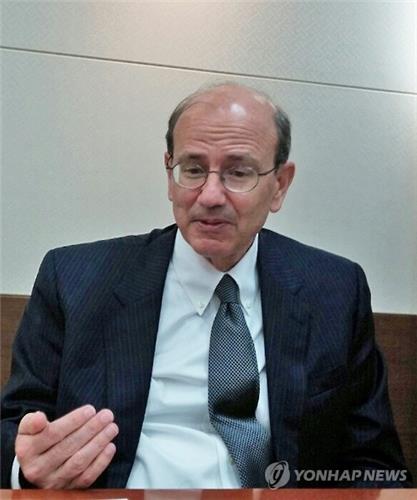- California Assembly OKs highest minimum wage in nation
- S. Korea unveils first graphic cigarette warnings
- US joins with South Korea, Japan in bid to deter North Korea
- LPGA golfer Chun In-gee finally back in action
- S. Korea won’t be top seed in final World Cup qualification round
- US men’s soccer misses 2nd straight Olympics
- US back on track in qualifying with 4-0 win over Guatemala
- High-intensity workout injuries spawn cottage industry
- CDC expands range of Zika mosquitoes into parts of Northeast
- Who knew? ‘The Walking Dead’ is helping families connect
Use of name ‘Sea of Japan’ is current U.N. practice: U.N. official
SEOUL, July 7 (Yonhap) — The United Nations will continue to use the name “Sea of Japan” for the body of water between Korea and Japan as long as it remains the most commonly used term in the international community, a senior U.N. official said Thursday.
U.N. Assistant Secretary-General for Legal Affairs Stephen Mathias told Yonhap News Agency the global body does not have a policy or resolution on the name of the waters South Korea calls the “East Sea.”
But it is also U.N. practice to use the most popular name in cases where there is a dispute over a geographical appellation, he said.
“The U.N. will always use the most commonly used and widely recognized name,” Mathias said in the interview at the Korea National Diplomatic Academy in Seoul. “It has been a matter of policy for the United Nations not to use two names except where the General Assembly specifically indicates that it should do so.”
In the case of the British territory of the Falkland Islands, the U.N. General Assembly adopted a resolution calling for the parallel usage of its Spanish name, Malvinas.
“In the absence of an Assembly decision with respect to this particular issue (of the East Sea and Sea of Japan), it would not be appropriate for the (U.N.) secretariat unilaterally to begin to use the two names,” Mathias said.

U.N. Assistant Secretary-General for Legal Affairs Stephen Mathias speaks to Yonhap News Agency in an interview at the Korea National Diplomatic Academy in Seoul on July 7, 2016. (Yonhap)
South Korea has long campaigned for dual usage of the two names, arguing “Sea of Japan” is a legacy of Tokyo’s imperialist past, including its 1910-45 colonization of the Korean Peninsula.
Japan registered the name “Sea of Japan” with the International Hydrographic Organization in the early 1920s when Korea was under Japan’s colonial rule.
For Seoul, the naming issue is especially sensitive because Japan continues to lay claim to South Korea’s easternmost islets of Dokdo, which lie in the East Sea.
“I think the United Nations is well aware of the Korean position,” Mathias said. “I can say that the United Nations certainly understands how important the issue is to the Korean government. At the same time, we feel that we should proceed in accordance with our standard practice of using the term that’s most commonly used and widely recognized.”
In 2014, the U.S. state of Virginia passed a law requiring local school textbooks to use both the South Korean and Japanese names for the sea, giving a boost to Seoul’s campaign.
Asked if the growing use of “East Sea” could influence the U.N.’s own practice in the future, Mathias held out such a possibility.
“I think if at some point the use of another description becomes more common and widely recognized then the U.N. practice could be adjusted,” he said.
The legal expert also offered some advice.
“I think that might be one possibility — is to concentrate on the uses of the term in the international community more broadly so that there’s a change in which term is used most commonly.”
Mathias, who was on his first visit to South Korea to speak at the Seoul Academy of International Law, is scheduled to leave the country on Friday.











